
Part Five
August
1st. Today we rested. I visited my friend Lober, took a look at the country, was in the mountains and in the forest, and took a walk along the river where I saw innumerable large and small snakes and turtles. The river is 900 miles long, rises in the mountains 12 miles from here and flows into the Atlantic ocean. In the evening the wagons were taken across the river, and we spent the night on the opposite bank.
2nd. On the other side of the river was a beautiful fountain recently erected by my friend Lober. I had apparently drunk too much of its water, for I got a spasm in the stomach and suffered much pain. Today the road was very bad to travel. We only drove a few miles and stopped near a small stream, where we were much tormented by mosquitoes.
3rd. Stayed in the wagon ill, and suffered a great deal from heat and pain. 7 wagons loaded with provisions came up behind. They were on their way to Fort Eve. We were met by 24 riders on mules from California. They were mostly Germans, and among them were 4 from Holstein.
4th. Williams, the merchant, caught up with us. I felt better today and drove the oxen. Saw large herds of wolves, deer and antelopes. We forded many small streams that often were alive with snakes. We had a bad road over which it was frequently dangerous to travel. Some miles ahead of us we saw high mountains that were covered with snow. Our camp was in a forest through which ran a small stream.
5th. We had been driving scarcely half an hour, when a heavily loaded wagon turned over. The driver and his pregnant wife were in it. They were buried beneath boxes and packages, and we thought they were dead. They looked like corpses when we pulled them out; but after an hour passed they recovered, and had not suffered the slightest harm. Nor was anything broken on the wagon. Williams again drove away from us. As we arrived at the place where we were going to camp, our leader's horse became frightened and threw him off. He sprained both arms and his neck.
6th. We rested while our leader was very ill. I had to take care of the oxen and passed the time fishing; but mosquitoes and the snakes drove me away. I found a grave that had been clawed open, and in it were the bodies of 2 small children. I had apparently driven the wolves away from it, for the bodies had only been slightly gnawed at. A board was lying by the grave with the names written on it: Christian Voss, Charlotte Voss from Schwerin in Mecklemburg, were buried here August 5th, 1854, by their heartbroken mother.
7th. Our leader felt somewhat better. We had a butcher and a clever quacksalver in our party who could cure many things.
Today the journey was continually over mountains and through deep canyons. We also came upon sandy soil, that made traveling very difficult. I again found another fresh grave that had been scratched open; but it only contained some bones and torn clothing. Here there was also a board, and it bore the name: Peter Wichmann, journeyman tailor from Schwerin in Meklemburg, died August 6, 1854. Our provision wagon turned over, but nothing in it was harmed. We camped at a spring, from which flowed sufficient water for ourselves and the cattle.
8th. Today our leader was again on horseback, and we drove over clay or loamy soil, on both sides of the road mountains and hills of clay were to be seen in all imaginable colors, and it all looked very beautiful from a distance. The road was better than it had been for the last few days, and there was still an abundance of water. We arrived in good time at a beautiful river, called Litl Blukrik, which is 600 miles long, and camped in the valley through which the river was winding its way. Here too was a very romantic region. There were high mountains close to us that judging from appearances must contain much metal, for they are covered with a heavy coating of iron. Here there were also 2 hot springs from which flowed water that was boiling hot.
 9th.
We slept but little last night, as the many mosquitoes at this place gave
us no peace. As we yoked up, thousands of ravens gathered about us, and
the last wagon had hardly left the place, when they alighted. But they
were immediately put to flight again by 4 wolves that were also on the
look out for food. Still they continued to fly over us persistently for
half an hour or so, and made us quite dirty. We had to shoot at them to
drive them away. All day long we drove through a beautiful valley, and
had a good road that continued to run close to the river. Once more I
saw a grave by the roadside, where the body had been devoured by wolves.
It had been the remains of an old woman. Her head, covered with grey hair,
a comb, bones and torn clothing were lying in the ditch. In the evening
we came out of the valley onto a hillock, where we had a poor place for
camping, as we were obliged to fetch water and wood for fuel from a mile
away.
9th.
We slept but little last night, as the many mosquitoes at this place gave
us no peace. As we yoked up, thousands of ravens gathered about us, and
the last wagon had hardly left the place, when they alighted. But they
were immediately put to flight again by 4 wolves that were also on the
look out for food. Still they continued to fly over us persistently for
half an hour or so, and made us quite dirty. We had to shoot at them to
drive them away. All day long we drove through a beautiful valley, and
had a good road that continued to run close to the river. Once more I
saw a grave by the roadside, where the body had been devoured by wolves.
It had been the remains of an old woman. Her head, covered with grey hair,
a comb, bones and torn clothing were lying in the ditch. In the evening
we came out of the valley onto a hillock, where we had a poor place for
camping, as we were obliged to fetch water and wood for fuel from a mile
away.
10th. Here also the mosquitoes kept us continually awake, and sleep was out of the question. We left early and came again into the valley, where we stayed all day, and in the evening we found a good camping place for ourselves and our animals. This was once more on the Little Blue river. Here was a wealth of flowers, as beautiful as if they had been planted by an expert gardener. I saw many flowers among them that grow in Germany also. To me the most remarkable was the Cactus, that is often nursed for a long time in Germany before it blooms. Here it grows wild, however, I counted 9 different varieties of it, of which 7 bloomed beautifully. Close to our camp was a forest in which grapevines were growing. The grapes were not large, but any of them were already ripe, and we enjoyed eating them.
11th. This morning everyone picked flowers and grapes which we took along with us on the journey. The road continued through the valley and near the river, but we often had to go through deep canyons and were exposed to much danger. We saw some Indians who paid no attention to us, however. We met some wagons that were coming from California. We camped on a hillock near the river. Late at night we saw Indians prowling around us in the distance, and the watch was doubled. Two of the crew watchmen who had ventured too far away were attacked by the Indians and robbed. Hearing their cries for help, several rushed out to the place. Three Indians were wounded and remained lying on the ground. Later on the Indians shot at us in camp from the other side, and a woman was slightly wounded. Some gunshots were fired at them, and we heard no more of them.
12th. Today we rested because many of our oxen had run away. It was only towards evening that we found them again. Still more Indians had apparently been wounded, for we saw blood at several places. Close by us was a rather high mountain. I ascended it and wrote in my diary. From here I could see for a distance of many miles. Wherever I looked was beautiful country, and rivers and streams cries-crossed the region. Forests were also in sight, but nowhere a house or a piece of cultivated land. I regretted that several thousands of my countrymen were not here. They often live in great poverty; but here they could take over the beautiful country for cultivation for the asking, and make a good living from it.
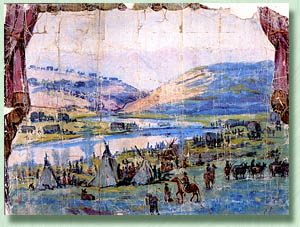 13th.
Again our journey w[non-legible word] through the valley and along the
river. The road was especially good today and the region particularly
beautiful. 14 oxen ran up to us, and we took them along with us. Again
we saw some Indians. Many of them live in this region, especially along
the streams. We also saw many deer with great antlers, and many snakes.
These were not only in the swamps, but also near and on the road. Many
of them were run over and killed and others died from being stepped on.
In the evening we turned away from the river and camped near a spring.
13th.
Again our journey w[non-legible word] through the valley and along the
river. The road was especially good today and the region particularly
beautiful. 14 oxen ran up to us, and we took them along with us. Again
we saw some Indians. Many of them live in this region, especially along
the streams. We also saw many deer with great antlers, and many snakes.
These were not only in the swamps, but also near and on the road. Many
of them were run over and killed and others died from being stepped on.
In the evening we turned away from the river and camped near a spring.
14th. A young Indian joined us this morning as we yoked up. He was naked, as are all the Indians in this region, and was only covered by a woolen blanket. He was armed with bow and arrow.
In the beginning we took him for a spy; but he behaved himself well, was pleasant and agreeable, and stayed with us all day. Once more we came close to the river, but only for some miles. Then we drove up on the higher land, and had a good road. Late in the evening we came across a good camping ground. The bows of the Indians are about 4 feet long, and are often made of the rib of a deer. Otherwise they are made of wood from a tree that looks very much like the heather, which grows in Germany. This tree is called Grieswuth (greasewood--Transl). The bow is wound with gut which gives it strength. The string is made of sinews from the spine of a deer. The arrow is a straight, hard sapling. about 2 1/2 feet long and about half an inch thick. To the end is attached a wide, sharpened piece of iron, or a large sharp piece of flint. With this they can shoot and kill deer, roes, wild horses and even buffaloes from a distance of 200 paces.
15th. Although the camping ground was good, it would have been better, had the mosquitoes not been there. The Indian left us this morning and four others joined us. They asked for something to eat, which was given to them, and then walked on. Last night's crew of watchmen had gone to sleep and the cattle had run 3-4 miles away. We had much trouble getting them together again, and were late in getting away. The road was extremely good, the region was beautiful, and the grass taller than I. We camped near a spring, and from here we could see Fort Cane.
16th. Today we had left by 4 o'clock. We met 24 riders on mules coming from California, also some Indians on ponies, wild horses that have been caught and tamed by the Indians. Around noon we passed by Fort Cane and made a brief halt. It is a small unimportant fort, occupied by 200 soldiers, and it was built here to protect travelers, so that they are not attacked by Indians, as nevertheless happens now and then. The fort consists of 8 dwellings and some barracks, all built of lumber, and has neither wall nor earthworks. We camped on a hillock, where there was neither water nor wood and had to content ourselves with bread and pork.
17th. Again we yoked up at 4 o'clock. At 10 o'clock we came to a broad river called South Platriffer, where we had dinner. The river was to the right of us, and to the left there was a mountain. Between these lay a beautiful plain, about 4 miles across. In the mountains and on the plain grazed thousands of buffaloes, that were only mildly frightened. We were met by 30 wagons and several riders on horseback and on mules, all of whom had come from Mexico. There were many Germans among them. We only drove a few miles farther in the afternoon, and camped along the river.
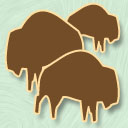 18th.
We had a violent thunderstorm during the night and it rained so hard that
we could not stay in bed on account of all the water. Wolves and buffaloes
howled and bellowed all around us, and we often had to drive our guests
away by shooting at them. Here there are also many large snakes, and some
of them that are vicious have already pursued some of our people. We are
still traveling along the river and among buffaloes. As far as one could
see, the region was covered with buffaloes. From 6 o'clock this morning
until noon I saw more than a hundred thousand of them. No one who has
not been here to see for himself, can form any idea of such vast hordes
of wild cattle. One has to imagine an area 2 1/2 German miles long and
1 mile wide, and such a piece of land I saw covered with buffaloes. There
are probably many who cannot believe this, although it is the truth. We
also had a good road today, and camped along the river.
18th.
We had a violent thunderstorm during the night and it rained so hard that
we could not stay in bed on account of all the water. Wolves and buffaloes
howled and bellowed all around us, and we often had to drive our guests
away by shooting at them. Here there are also many large snakes, and some
of them that are vicious have already pursued some of our people. We are
still traveling along the river and among buffaloes. As far as one could
see, the region was covered with buffaloes. From 6 o'clock this morning
until noon I saw more than a hundred thousand of them. No one who has
not been here to see for himself, can form any idea of such vast hordes
of wild cattle. One has to imagine an area 2 1/2 German miles long and
1 mile wide, and such a piece of land I saw covered with buffaloes. There
are probably many who cannot believe this, although it is the truth. We
also had a good road today, and camped along the river.
19th. I got up early in order to see the beautiful country in which we were. Two others went with me. We ascended a mountain and were able to see as far as we wanted in any direction. No human being, no house or cultivated land was to be seen, but buffaloes in such numbers that I am not able to describe it. It is to be regretted that such a magnificently beautiful region is only inhabited by some almost wild people and wild animals. Today the trail was in some places so full of buffaloes that frequently we could not get through, and it was only by shooting that we could open a passage for ourselves. Many of them already had been wounded by our shooting at them; but as we were in no need of meat, the hunt was not carried on in earnest. The buffaloes are not vicious; they run when whipped or when a stone is thrown at them. But if they are being fired upon and pursued, they often become enraged and charge at people, horses and wagons. I experienced an example of this today. The trail was good and the camp was on the river.
20th. Practically all the men had to stay up during the night, while so many hyenas, buffaloes, wolves, skunks and other such animals at this place, were being driven back by continual shooting. Today we had a high mountain on one side. The plain was about 10 miles wide, the region beautiful and the road good. Today we did not see as many buffaloes as on the previous days. We met 2 Caravans coming from California.
21st. During the night we had a violent thunderstorm, but without rain. One ox died, and this was the first one to do so from Salt Crik to where we are now. I saw some skunks near camp this morning of which I killed one; but I immediately threw it away on account of its odor. The body of these animals is as large as that of a cat, and the tail is a large as that of a fox, but the head is small, the coat is white with black markings and the hair is wooly and as soft as silk. At the tail the hair is 6-8 inches long. When they run, the tail rests upon the back, and it looks very beautiful. As soon as these animals are pursued, they either stand perfectly still or run quite slowly, expelling urine towards towards their pursuer. This I have experienced myself, and have had to throw clothes away. If anyone gets some of it in his eyes. he is in danger of becoming blind. In this respect I have also experienced an example in the case of a boy. These animals have their dens or homes in the earth, and often in the middle of the trail. As has been the case for the last few days, the region through which we passed today was also beautiful, and our camping ground was near the river.
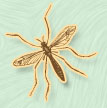 22nd.
The mosquitoes kept us awake last night, and this morning most faces were
much swollen. We departed at an early hour. The road continued close the
the mountain-side, as there were many deep ravines along the river. Towards
noon the mountains came to an end; they continued off towards the left,
and before us we saw a broad, open plain on which many thousands of buffaloes
were grazing. We met a train of 16 wagons coming from St. Eve. After that
came 6 gentlemen and 4 ladies on mules from California, 5 other mules
were loaded with provisions and luggage. 4 enraged hyenas approached our
lead wagon, and they were frightened away by a few shots. When the sun
was setting we came to the river and stayed there.
22nd.
The mosquitoes kept us awake last night, and this morning most faces were
much swollen. We departed at an early hour. The road continued close the
the mountain-side, as there were many deep ravines along the river. Towards
noon the mountains came to an end; they continued off towards the left,
and before us we saw a broad, open plain on which many thousands of buffaloes
were grazing. We met a train of 16 wagons coming from St. Eve. After that
came 6 gentlemen and 4 ladies on mules from California, 5 other mules
were loaded with provisions and luggage. 4 enraged hyenas approached our
lead wagon, and they were frightened away by a few shots. When the sun
was setting we came to the river and stayed there.
23rd. The road soon turned off from the river again, and meandered through high sand hills with turnings and twistings. We met a train of 12 wagons, that had been resting already for some days. The people were French. They passed the time hunting, and had already killed many animals of different varieties. Here I had the opportunity of seeing a buffalo at closer range. The buffalo is as large as a middle-sized ox, the head is small, the horns short but thick, it has a long mane, and hair like a horse. From the head to behind the front legs, all the hair is black and long and woolly. Most bullets rebound, when they do not hit the buffalo directly in the breast or in the hinder part of the body. The meat has a rather sweet taste and is rarely fat. A horse must be able to run fast in order to overtake a healthy buffalo. I have seen a buffalo receive 4. bullets and nevertheless run away, although blood was streaming from it. But every buffalo that is shot or is lame must die. If it does not die itself, it will be gored to death by the others, for they will tolerate no sick ones among them. I saw that happen today. Three were gored to death, and the Frenchmen took them and pulled their hides off. Every day we come across more than 100 dead buffaloes. They are food for the wolves of which there are also plenty here. Late at night we came close to a river and stayed.
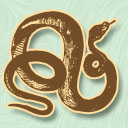 24th. We were late in getting started, as something on a wagon had broken.
In a small bush one of our drivers, Frenchman, shot a snake, 12 yards
long. It was black with yellow stripes, and as he shot it, it was laying
quietly in the grass. The shot struck its head, and it raised its head
about 4 feet from the ground when it received the shot. Then it immediately
lay down on its back, dead. I saw still 2 more about 5 yards long, dozens
of small ones from 2 to 3 yards long, often lying or crawling around near
the river close by us. It rained all day, and for this reason we camped
at an early hour.
24th. We were late in getting started, as something on a wagon had broken.
In a small bush one of our drivers, Frenchman, shot a snake, 12 yards
long. It was black with yellow stripes, and as he shot it, it was laying
quietly in the grass. The shot struck its head, and it raised its head
about 4 feet from the ground when it received the shot. Then it immediately
lay down on its back, dead. I saw still 2 more about 5 yards long, dozens
of small ones from 2 to 3 yards long, often lying or crawling around near
the river close by us. It rained all day, and for this reason we camped
at an early hour.
25th. In the daytime it is always oppressively hot, and the nights are often very cold. During the night it froze, and there was ice on the water. Yesterday and today we saw only a few buffaloes, but many deer, antelopes, large and small snakes, and large birds that look very much like storks. On the other side of the river we saw high mountains covered with snow. We still keep finding our camping places along the river. The region continues to be exceedingly beautiful. At 10 o'clock in the evening a heavy thunderstorm broke, accompanied by rain and a strong wind. Tents blew over, tops were torn free from the wagons, and all the bed clothes were wet through and through. Clothing and cooking utensils blew away, and everyone had to seek shelter for the night as best as they could.
26th. Today we had a rest day, so that we could look for the things that had disappeared and dry our clothing, and the day was spent doing this. My wife as well as my daughters, Amalie and Doris, have been ill for some days.
27th. We slept well during the night. When we had driven about 6 miles, we came close to a river, and had to cross it. Here the river is a half a mile wide, and not too deep for one to wade through it, which I did 3 times today. The soil is sandy and firm. 24 oxen were yoked to each wagon, and today 10 more wagons came through. In doing so, some chains were torn apart; but otherwise everything went well. Thus our camping place was on both sides of the river this evening. For several days our fuel has consisted of buffalo and ox excrements. Trees are not to be seen in these parts.
28th. Early in the morning we began to get the remaining wagons across the river, and this was done today without causing any special damage. We were through with this at noon. As water is only to be found 20 miles from here, it was decided to stay. here for the remainder of the day. The last wagon had hardly been brought across the river, when 5 Indians came riding through it up to where we were. There was a chief among them. Our leader, who knew some of the language of this tribe, went forth to meet the chief. He gave our leader his hand and said we had nothing to fear from him. They were on their way to another colony to fight against the Indians. They asked for something to eat, and it was given to them. Now we noticed that not very far from us there were several hundreds of them, and we were considerably frightened. Before long 19 more of them came through the water; but they were all unarmed. They were given food also. They unsaddled their horses, and joined up with us. They were all dressed alike, which is to say they were naked. Across their shoulders hung a piece of hide and a piece of black cloth, reaching below the knee, and a piece of hide was tied across the abdomen. None of them wore any head gear. Some of them had their hair cut short, while others, and most of them, wore it a yard long. They were quite bold and wanted to see everything. We soon noticed that small trinkets and odds and ends were being stolen. Our leader, who did not trust their friendship, presented the chief with 100 pounds of coffee, 50 pounds of sugar, 50 pounds of pork, 2 sacks of flour, some pocket knives, mirrors and a small barrel of gunpowder. With this all of them were satisfied, and as it was getting dark, they saddled their horses and rode off to their comrades. We had to remain up all night, and every one of us had 2 guns, a pistol and a sword.
29th. Nothing disturbed us during the night, except the mosquitoes. We were yoking up the wagons when the chief returned through the river accompanied by 50 men. Now they were all armed. The chief wore a red band around his head, embroidered with pearls, and a green twig was attached to it, signifying friendship. He wore a red jacket and had a white cloth wrapped around his abdomen and legs. His shoes were of deer-skin, embroidered with pearls. His weapons consisted of a gun, which lay across his horse, 2 pistols in a girdle around his body, and a spear was at his side. The others carried a gun, 2 pistols, lance and shield, also bow and arrow. Their dress varied widely.
Some wore a jacket made of calico, while others had covered themselves
with many colored cloth, or had fastened it to their bodies with leather
straps. All were without head gear. Their horses were ponies (wild horses).
These also were decorated with many colored cloth. Their saddle trappings
were of the usual kind and nicely polished, as were their weapons. The
chief told our leader that he had come with his people to bid us good
bye, thank us for the gifts, and show us how they were decked out when
they went into battle. He would also show us how versed they were in the
arts of war. To begin with, some of them shot at a target with guns and
pistols, then with bow and arrow, and finally they fought with spears.
Their ability astonished us. I had never seen such skill among soldiers.
The most beautiful sight was when they galloped along and their hair streamed
out like the tail of a horse. 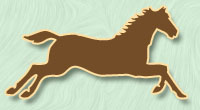 And
there is surely not to be found a tame horse that can compare with these
ponies in speed and sustained running. With their weapons in hand, the
Indians, jumped upon their fast running horses from behind and from the
side, and they were equally skilled in shooting and fighting with their
spears. Each of them got a piece of bread and pork. Pleased and satisfied,
they then rode away from us to their comrades who were waiting on the
opposite side of the river. There must have been 400 of them. Now we left
also, and to begin with the region was on a high level plateau. So far
in America, I have not seen land as bad as this. Then we again came to
a mountain that was quite awesome to look at. The trail often led over
rocks not broader on top that so a wagon could barely drive on it. On
both sides were very deep canyons. We drove down the side of a mountain,
and our leader said this was the most dangerous part of the entire journey.
The mountain was half a mile long, and very steep. Halfway over it there
were two terraces.
And
there is surely not to be found a tame horse that can compare with these
ponies in speed and sustained running. With their weapons in hand, the
Indians, jumped upon their fast running horses from behind and from the
side, and they were equally skilled in shooting and fighting with their
spears. Each of them got a piece of bread and pork. Pleased and satisfied,
they then rode away from us to their comrades who were waiting on the
opposite side of the river. There must have been 400 of them. Now we left
also, and to begin with the region was on a high level plateau. So far
in America, I have not seen land as bad as this. Then we again came to
a mountain that was quite awesome to look at. The trail often led over
rocks not broader on top that so a wagon could barely drive on it. On
both sides were very deep canyons. We drove down the side of a mountain,
and our leader said this was the most dangerous part of the entire journey.
The mountain was half a mile long, and very steep. Halfway over it there
were two terraces.
Here the wagons stood almost perpendicularly, and the greatest care had to be taken to prevent them from falling forward. We came down below with all the wagons, and without breaking even the smallest part. This was certainly a rare thing, as the whole mountain side was full of broken wagons.
Now we drove into a deep canyon and it became dark. And, what is strange in these parts, a thunderstorm came up, and it rained violently. We could not remain here, as there was neither grass nor water to be found. Wolves howled and droves of snakes bolted from all around us. We drove on until 10 o'clock, and then, tired and wet through and through, came to a river, the Northern Platriffer. Here we camped. Most of us did not care either to drink or eat, but wanted only to go to bed.
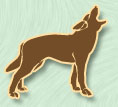 30th.
We were awake all night, for it rained incessantly; besides, mosquitoes
bit us and wolves howled constantly and ran around close by. When dawn
came and we got up to look around, we were in the midst of extremely beautiful
and impressive scenery. To the right of us was the clear and beautiful
river, and to the left a high and rocky mountain. Between these there
was a green valley half a mile wide through which our trail lay. We left
at 10 o'clock. The road was somewhat sandy and difficult for travel.
30th.
We were awake all night, for it rained incessantly; besides, mosquitoes
bit us and wolves howled constantly and ran around close by. When dawn
came and we got up to look around, we were in the midst of extremely beautiful
and impressive scenery. To the right of us was the clear and beautiful
river, and to the left a high and rocky mountain. Between these there
was a green valley half a mile wide through which our trail lay. We left
at 10 o'clock. The road was somewhat sandy and difficult for travel.
In the mountains we saw many wild animals some of which were totally unknown to us. The mountains continued for 4 miles, then they swung more to the left, we saw a great plain before us and the road became better. We met a caravan coming from Mexico. Today I killed two rattle snakes, 5 feet long. My son Carl, and an English boy, killed a snake which was 4 feet long, and which had 2 heads, one beside the other. it was yellow with brown spots.
31st. Early in the morning we met a caravan coming from California. We were informed that there were many Indians near by who were holding a victory celebration, for a victory attained in a fight with soldiers. Today we had to travel along a sandy trail and we only advanced a few miles. We made camp near a river, and have to travel 300 miles along its course.
Pioneers and Indians at a River Crossing, C.C.A. Christensen, no date
Home | FAQs | What's New | Topical Index | Testimony | Newsletters | Online Resources | Online Books | Booklist | Order/Contact | Email | Other Websites


